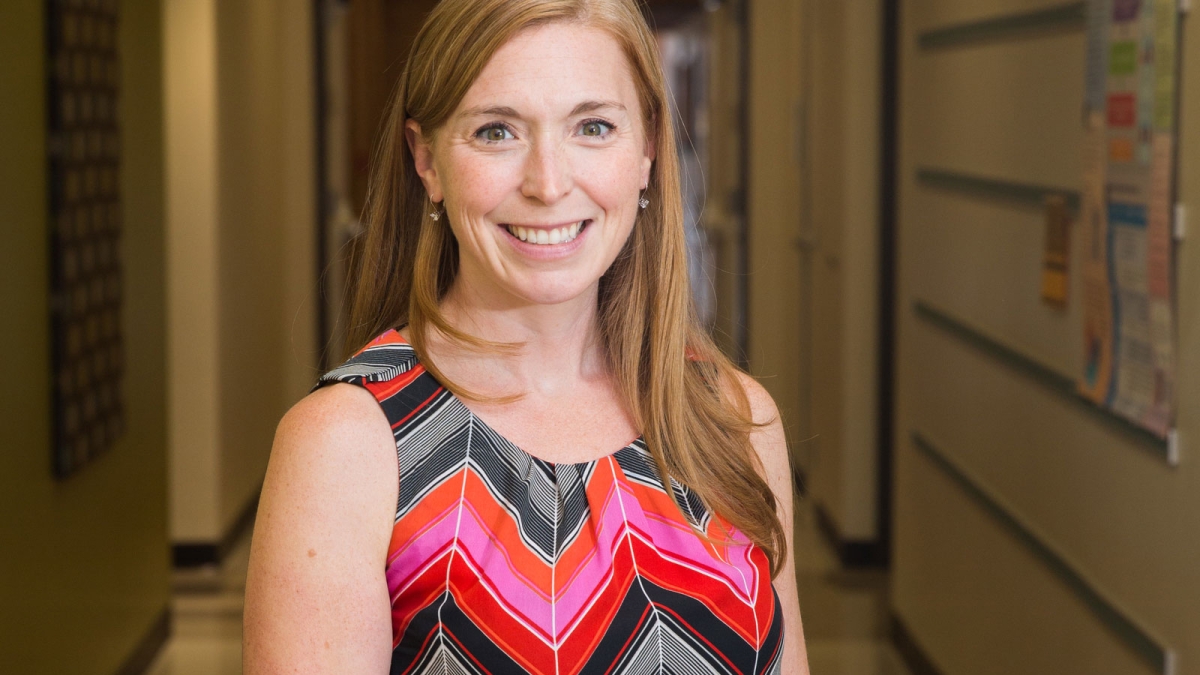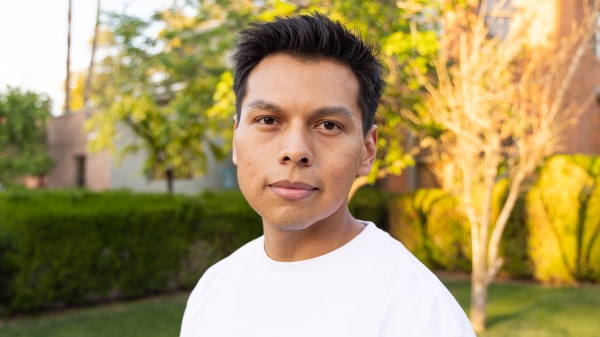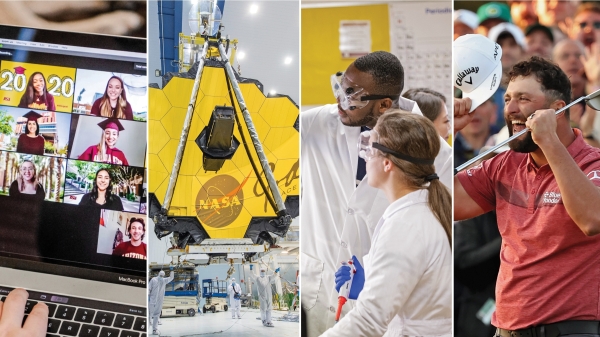Project ASSIST equips parents to help freshmen transition to college

Project ASSIST was launched after research that Leah Doane — an assistant professor in the psychology department and director of the Adolescent Stress and Emotion Lab — did into how students fared from their senior year of high school into their junior year of college. The parent-child relationship was key to students' outcomes.
Photo by: Deanna Dent/ASU News
As a young person makes that epic leap to college, the tether between parent and child stretches and snaps back like no other time of life.
A team of researchers at Arizona State University is trying to harness the power of the parental relationship to make students healthier — and more likely to graduate.
About 200 parents and their freshmen children are participating in Project ASSIST, an intervention designed to keep them engaged with each other in healthy ways.
“This is something that can really promote retention and well-being in ASU students,” said Leah Doane, an assistant professor in the psychology department and director of the Adolescent Stress and Emotion Lab.
Project ASSIST was launched after research that Doane did a few years ago.
In 2011, Doane started the ASU Transition to College study, in which she followed 80 young people from the spring of their senior year in high school to the spring of their junior year of college. She used a variety of ways to measure how they adapted to that transition.
She took saliva samples to measure the amount of stress hormones they secreted and had the students describe their feelings and activities in an electronic diary several times a day. They reported on whether they drank alcohol and how much they slept.
One surprising finding was that the students actually got a little more sleep once they got to college.
“But one thing they do that’s horrible is they have huge variability,” Doane said. “They have class at 9 a.m. one day, and if they don’t have a class the next day they’ll sleep until noon.
“Basically they put themselves through jet lag every day. We know that’s not good for their health.”
Doane said one important conclusion is that students’ perception that they are coping well with stress in high school can predict how well they actually manage during the college transition.
“This is something we can teach them — to have confidence in their ability to cope,” she said.
The study also found no large increases in student alcohol use overall during the transition to college.
“Right when students get here they have this pretty significant increase, but then alcohol use decreases back to the level it was before they got here,” Doane said.
The parent-child relationship was a key indicator.
“Students who reported higher-quality relationship with their parents had lower levels of alcohol use across the whole study,” Doane said.
That parental-empowerment concept appealed to another ASU researcher, Will Corbin, an associate professor and director of clinical training in the psychology department.
Corbin has studied alcohol use among college students for many years and was interested in testing an approach that was broader than just telling students to not drink.
“I was interested in focusing more energy in getting students involved in things that are incompatible with heavy drinking — more academically engaged, more engaged with the community, more focused on being healthy,” he said.
At the same time, there were negative media portrayals of students and drinking at ASU.
“We weren’t confident that this was truly a good representation of the typical transition-to-ASU experience,” Doane said.
So Project ASSIST was created with the hope of encouraging parents to help their children have a healthy transition to ASU.
Besides Corbin and Doane, the team includes Thao Ha, assistant research professor in the T. Denny Sanford School of Social and Family Dynamics, who studies romantic relationships; Tom Dishion, founding director of ASU’s REACH Institute; and the Education Outreach and Student Services department, which funded the work. The REACH Institute does research on children and families.
The study has two parts. In the first part, done last year, students and parents were asked to fill out daily diaries of their feelings, activities and observations.
Then Doane and Ha took that information and used it to create the content for the second part of the study, the intervention, which began this past summer.
About 400 parents of freshmen were recruited, and over the summer, half of them watched a series of 10-minute online modules that addressed different aspects of the transition to college. The other half had access to the typical services available to parents of freshmen.
The modules covered academic engagement, health behaviors (including sleeping, eating and drinking), romantic and peer relationships and emotional health. The content was interactive, with videos and quizzes that provided feedback.
“One video shows what parents think their child is doing during the day, and then it shows footage of what their child is actually doing. Sleeping until 12. Not going to the gym,” Ha said.
The goal is to improve communication skills and give parents tools to help their children from afar.
“It shows how to talk about friendships, which clubs you can join to meet nice people, and how to check in in a very neutral way about their romantic relationships and whether they feel lonely,” Ha said.
The content is also trying to strike a balance between prompting enough interaction and staving off “helicopter parenting.”
Corbin said the alcohol component tries to correct misperceptions.
“We show them normative data that shows that there is a large percent of college students who don’t drink at all — about a third of freshmen,” Corbin said. “And they tend to think other parents are more accepting of college drinking than they actually are.”
Parents are trained to be explicit.
“If you say ‘I expect you not to drink’ or ‘you’re there to learn, and drinking will get in the way of your academic performance,’ then those students do better,” Corbin said.
The modules give parents strategies about what to say.
“Don’t say, ‘Have a great time; just be safe.’ What does that mean? ‘Drink as much as you want; just don’t get into trouble’?” Corbin said.
Now that the freshmen are on campus, the parents are receiving text messages, reminding them of what they learned during the modules, prompting them to engage with their children and informing them of events such as Family Weekend on Sept. 25.
Students and parents were surveyed before the study and will be surveyed again afterward, in January. Parents also will be asked to provide feedback on the program to refine it.
“We’ll look at how one outcome will affect another. I expect if the program helps reduce alcohol consumption, it will also improve academic performance,” Corbin said.
Eventually, the program could be offered as an option for all incoming families, with the goal of increasing student retention.
That’s also what Doane is studying in her next research projects, two complementary studies that are focused on Latino students.
“In the last 10 years, we’ve increased the Latino (high school) graduation rate and the Latino college-entrance rate, but we’re lagging behind on the college-retention rate for Latino youth,” she said.
In the first study, Doane will look at cultural factors that affect Latino youths’ decision to attend college and how they engage academically when they arrive. She’ll consider work and family balance and whether the students join clubs with other Latino youths.
That study is being funded by the William T. Grant Foundation, which funds research that promotes academic equity.
The other study, which Doane is doing with Nancy Gonzalez, an ASU Foundation Professor in the psychology department, is being funded by the Phoenix-based Helios Education Foundation, which works to improve access to higher education.
In that research, Doane will hold focus groups with high school juniors in Yuma, Tucson and Phoenix, asking about the people who are most influential in their decisions about college.
Doane said that all of her research is finding ways to help students even beyond college.
“We want them to be successful in the workplace once they leave the college environment.”
More Sun Devil community

Students amped for Devilpalooza 2024 just around the corner
The thrill of live music coursing through your body. Crowds of Sun Devils dancing the night away in a jam-packed arena. Electric…

Dean's Medalist embraces heritage language through poetry
Editor’s note: This story is part of a series of profiles of notable spring 2024 graduates. When he first enrolled at Arizona…

Celebrating graduates: 2020–24 time capsule
Editor's note: This story originally appeared in the summer 2024 issue of ASU Thrive magazine. It has been a wild four years,…